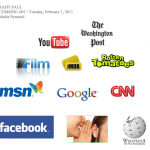Author Archive

In his Washington Post article entitled “I Really Need You to Read This Article, Okay?“, Joel Achenbach writes about the popularity shift of newspapers as a means to get the news.
“Our future is on the Web,” he begins.
The term “newspaper journalism” used to resonate a sense “literary efforts [levitating] above the commercial fray,” but, according to Achenbach, no longer is this true. Nowadays, it’s all about page-views, about “eyeballs.”
“Marketing…may increasingly become part of the journalistic mix,” Achenbach writes.
But there is still respect for skill. Regardless of platform, “good writing remains good writing” and although “the Web tends to be a chattier place…it is still a place where readers appreciate a well-crafted sentence, a nuanced thought, a fully elucidated thesis and commentary undergirded by fact, honesty and a generosity of spirit.”
To quote the HBO series The Wire, it’s the same game as always — just more fierce.
At the end of the day, though, our readers aren’t unintelligent.
“The most-read stories online are often what we’d all agree are the best pieces of journalism…but page-views can also lead journalists away from what we do best,” Achenbach reminds us.
This article wasn’t necessarily eye-opening, but it was definitely an interesting and relatively amusing rant.
Achenbach maintains his own blog, Achenblog, quite regularly.
 No Comments »
No Comments »
Briggs describes the concept of microblogging — or blogging in under 140 characters — how it emerged, and, perhaps most importantly, how to build a community of followers.
Personally, I find this kind of blogging pointless. If you want to blog about something and make it short, just write a regular ol’ blog and make it short — why restrict yourself to 140? Laziness? Principle? Because it’s a “one-click” world? Maybe I don’t have a lot of faith in people, but I figure that if anyone that’s not going to read a blogger’s regular blog is not going to care any more about a blogger’s microblog just because it’s merely shorter and more to to the point.
Briggs, though, argues that “the ease of publishing, combined with the ease of consuming, has contributed to microblogging’s rapid growth” and that “blogging can intimidate writers who don’t feel they can consistently write anything of interest.” I suppose microblogging just isn’t for me — I feel that if you want to say something, you have to put a little more effort into it than 140 characters. More people are going to argue with a 140 character statement than a 15-page essay because there is much more room to disagree and tear down.
“Services like Twitter invite users to post a quick update on what they might be doing, thinking or planning at any given moment.” For Christ’s sake, no one cares what you’re doing, thinking or planning at any given moment! And if they are, they need to spend less time on Twitter and more time interacting with real people. I’m sorry, but Twitter is for people that either matter or THINK that they matter. Following celebrities is cool, I get it! But following your peers isn’t — it just makes you a weirdo. I can respect why people use it, I can, but seriously, it’s just not for me.
To build one’s network, Briggs suggests “searching for terms [one] is interested in.” If ya find someone worth stalking, follow them! It’s that easy! Briggs also suggests to build a network “by posting good content and promoting those you follow.”
 No Comments »
No Comments »
 Mandy Jenkins In today’s class, Mandy Jenkins, a social media producer for the DMV’s local (but not hyperlocal!) news Web site entitled TBD, came in to talk.
After growing up in Zanesville, Ohio, Jenkins received her BS in journalism from Kent State University and continued on to get her Master’s in media management. She then created ZombieJournalism.com, a site self-proclaimed as “creating hope for the future of journalism and dropping some knowledge on journalists everywhere.”
Jenkins began working for TBD simply by “reaching out and getting connections online.” She attests to being the “‘voice’ of TBD in social media” while also providing staff training and writing “an occasional bit of breaking news.” Additionally, she has extensively begun building TBD’s blogging network.
She advises to check your e-mails as often as possible! Not just twice a day, like someone she use to correspond with. Twellow.com, MuckRack.com and Trendsmap.com are also some of her strongest Web site recommendations.
 No Comments »
No Comments »
“News reporting methods such as crowdsourcing, open-source reporting and pro-am journalism are becoming the focus for more and more news operations in the United States.”
Crowdsourcing: “The Internet allows enthusiastic communities to come together and provide the value for a given Web site. Crowdsourcing focuses that community power on a specific project and demonstrates how a group of committed individuals can outperform a small group of experience (and paid) professionals.”
Open-Source Reporting: “The term ‘open-source’ refers to design, development and distribution ‘offering practical accessibility to a product’s source (goods and knowledge).’ Applying this concept to journalism means using transparency in reporting in order to provide a benefit to your audience and possibly acquire benefits from your audience.”
Pro-Am Journalism: “The most unfiltered form of collaborative journalism allows the audience to publish directly to the same platform, or Web site, that professional journalists use to publish their news. Because journalists can no longer be gatekeepers, creating opportunities for an audience to self-publish and then adding a layer of journalism on top produces broader and deeper coverage than the journalists could by themselves.”
These are Briggs’ definitions for the terms that he discusses in length in the third chapter ofJournalismNext. These definitions are all related to the idea of collaborative publishing, which, according to Briggs, “is not a fad that is going away anytime soon.”
He provides that the process of crowdsourcing “remains an experiment” due to its circumstantial needs — in other words, it works for some situations and fails for others.
Briggs states that open-source reporting is important because it “welcomes the audience’s feedback” and, by doing so, increases journalists’ “credibility and social capital.”
Lastly, the “essence” of pro-am journalism all boils down to the fact that “once you understand that no news organization can be everywhere, all the time,” it just makes sense to have it! This participatory form of journalism allows a d0-it-yourself (DIY) method to posting and acquiring the news.
 No Comments »
No Comments »
“For college journalists, blogging means learning a new content-management system, building an audience for your writing and reporting and cultivating a collaborative community once you have that audience.”
Briggs extends his discussion on blogging into the second chapter of JournalismNext. He first explains why blogs are important and then dives into how they can be used to your advantage and your advancement up the working ladder.
After Briggs decrypts some blogging language (blogroll, permalink, trackback, moblog), he explains why a blog should be appealing appearance-wise — the better, more eye-pleasing your blog looks, the longer users will want to stay on it. He also advises that once a user’s blog is created to try to see and use their blog “as a notebook, compiling [their] notes and story ideas as drafts in a blog system” and that to post “approximately once a day” is healthy.
Briggs closes with this truth: “If you can find the fire to blog, you will reap the rewards.”
 No Comments »
No Comments »
“Previous generations of journalists — and other workers in all industries — had the luxury of expecting some supergeeks in their organizations to take care of the digital duties for them. For better or worse, those days are gone.”
I really enjoyed the way in which author Mark Briggs began the first chapter of JournalismNext. He immediately outlines the things he’ll teach — how Web browsers work, how to make RSS (Really Simple Syndication) useful, how FTP (file transfer), HTML (HyperText Markup Language), CSS (Cascading Style Sheets) and XML (Extensible Markup Language) work. In a nutshell, the chapter explains how to create a blog and an RSS feed (as well as how to subscribe one).
The chapter also outlines how Web pages are documents created with HTML codes stored on a computer that is running as a Web server and how a Web browser retrieves that Web page from the Web server. Additionally, Briggs adds that “in short, CSS makes Web sites look cool” by giving “Web designers the power to realize their creative visions in Web browsers.”
 No Comments »
No Comments »
 Posted by rpaul2 in Tech Blog, tags: /Film, CNN, Facebook, Google, iMDB, MSN, Rotten Tomatoes, Washington Post, Wikipedia, word of mouth, YouTube
Posted by rpaul2 in Tech Blog, tags: /Film, CNN, Facebook, Google, iMDB, MSN, Rotten Tomatoes, Washington Post, Wikipedia, word of mouth, YouTube
For my Media Pyramid, I put Facebook, word of mouth and Wikipedia for my most common methods to acquire news. Although they’re not the most effective ways to get news, they’re how I get the news in my everyday life, regardless. MSN, Google and CNN come in next — be it on the Internet on their respective websites or on the television for CNN. /Film, iMDB and Rotten Tomatoes help me get the news that I TRULY care about! And, lastly, the Washington Post and YouTube are rare supporters in my everlasting quest to get the news!
 No Comments »
No Comments »
|




 Entries (RSS)
Entries (RSS)